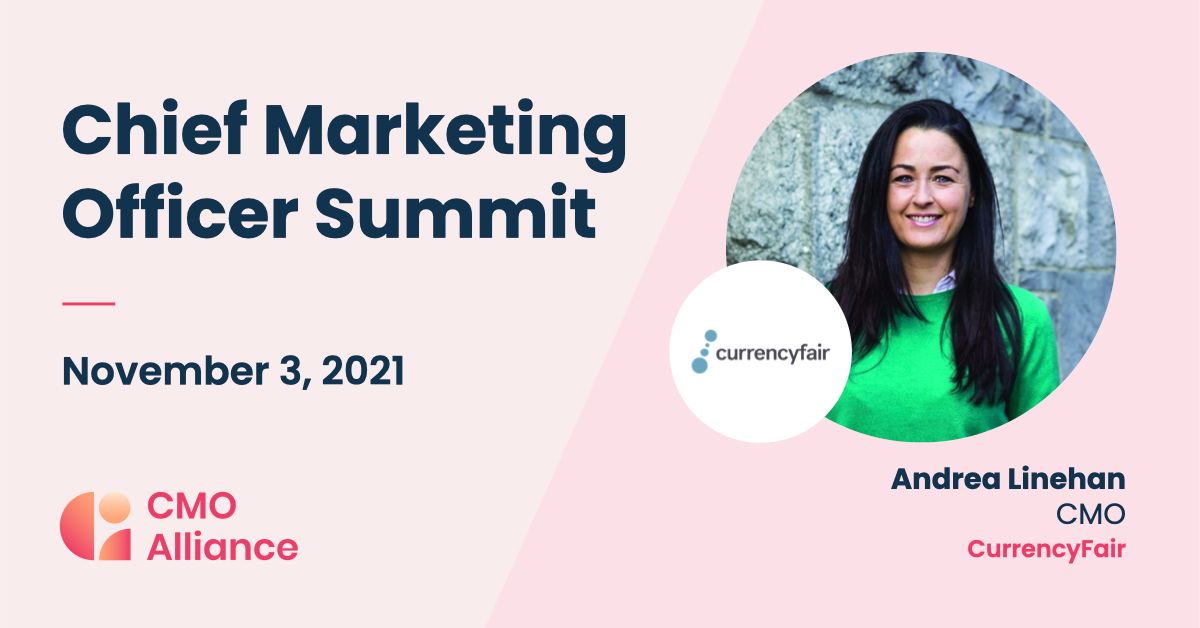On a recent episode of CMO Convo we were joined by Andrea Linehan, CMO of CurrenFair, to discuss why it’s important for marketing teams to stop worrying and learn to love their finance departments. Andrea explains how her background in finance has allowed her to build strong interdepartmental bonds and shares top tips for others wanting to do the same.
You can find the full episode and more here, but read on to see what we discussed.

Today we're talking about a subject that is going to be important not just to CMOs, but to marketers in general, which is getting marketers on board with Finance and vice versa.
Because it's one of the big things, it's not unreasonable to say all marketers fear finance to some respect. One of the scariest things you can hear as a marketer are those five words, "how much will it cost?"
- Andrea's background and approach to marketing
- Building bonds between marketing and finance
- Teaching finance the benefits of marketing
- Creativity and cost consciousness
- Three golden rules for marketing and finance departments to work together
Andrea's background and approach to marketing
Before we get into marketing and finance, maybe you could introduce yourself, Andrea, and tell us a bit about your professional background and your current CMO role?
Sure. So Andrea Linehan, Irish, my background actually is from an academic perspective in finance and accounting. But I decided when I graduated that the life of an accountant wasn't for me.
So I moved over to the Middle East, to Bahrain, on a management trainee program with a travel retail company, and it was very much a... you got to spend time in the different departments, and they were grooming you to be the next general manager of some international airport duty-free.
Fabulous experience. But I learned pretty quickly that the travel retail industry wasn't for me. So I left Bahrain and moved to Oman and I took up a position as a sales and marketing manager with a destination management company.
Now, while I had some basic sales experience throughout my part-time jobs in school and college, I had absolutely no marketing experience, but I just thought, how hard could it be? Wow, did I learn a lesson very quickly, because marketing is incredibly complex.
I didn't, up until that point, have an appreciation for the kind of skill set and planning and execution and strategizing that's actually required. So it was very much my first introduction to marketing and it was also very much a learn-by-doing experience.
I was the only supposed marketer in this startup so it was a lot of trial and error with very little budget. But it gave me the bug. I moved on then to a public-private partnership between the Omani government and an MRT developer.
That was essentially building a town for want of a better word, it was an integrated tourism complex with 1000s of residential properties, golf courses, hotels, marinas. It was all-encompassing and really exciting but more importantly, it was my first opportunity to actually work with and for an experienced marketer.
And while I'm a big believer in learning by doing nothing accelerates your learning more than actually learning from someone. I had a number of different VPs of Sales and Marketing that I worked for, in my time with that company, and each one came with very different strengths.
Some of them were much more sales-focused, and commercial, others are much more about brand building and design. And others more on the strategic innovation side. So I was so fortunate to get this broad exposure to the different facets of marketing. I was hooked, to be honest. I really didn't lean into my finance background at all in any of those roles.
And when I look back, a big reason for that is because there was never any expectation on me when I was at entry-level or even lower mid-management level, to really own the numbers in an instrumental way.
I owned budgets and very big budgets, and I was able to spend, and I made sure that all these great things happened with it. But to get really down into the nitty-gritty of what the return on investment was just wasn't part of my remit.
That always stuck with me because obviously, I watched my VP of Sales and Marketing have to own every last digit and the return on it. So it was the first time I recognized that there was a real gap in terms of the training and the responsibility that was being handed down to marketers at certain levels.
Again, phenomenal experience with that, I decided then to leave the Middle East and do a full-time MBA. Really, that was an opportunity for me to say, right, how do I take my finance undergrad, all the sales and marketing experience, and look to see what I want to do as my career going forward.
I got exposure through the MBA to all the different functions and then just as I was finishing the MBA, I met the founders of a FinTech startup, and they were looking for someone to build and lead on their sales and marketing function.
That's how I ended up in FinTech and that's how I ended up committing properly to sales and marketing content, saying yeah, this is where I need to be. I've been in FinTech and as a CMO now for nearly seven years.
It's quite an interesting route to your position now, particularly the Finance backgrounds. It's an unusual one for a marketer, do you think it gives you a certain philosophy with how you approach the CMO role, and how you approach marketing in general, that might be different than other marketers?
There's a number of ways I have found that it has really benefited me. One is even in the vernacular, so just the language around finance is something that I'm very familiar with, I'm very comfortable with, I can talk about it very easily, and I'm not afraid of it. I think that has really stood for me. Stood for me both ways.
One, even having conversations with CFOs and CEOs around that side of marketing, probably comes a bit more naturally, to me. And even then, in particular, working in FinTech, because you're selling financial services, which tend to be dripping in all of this financial terminology.
So having the familiarity with that also has really benefited me. But look, I have to say I was out of that game for quite a while, when I was in my 20s, it was really only when I came back into FinTech and moved into a CMO role that I needed to re-familiarize myself with all of that came back.
And it's like a muscle, you've got to get back into the practice of it and remind yourself of that side of the house. But it probably came back to me a bit quicker because of having that underpinning and that foundation early on.

Building bonds between marketing and finance
So you naturally have this inherent lack of fear for the finance side of the business. Is that something you're instilling in your marketing department with how you build your team and how they work?
Because you said it's not something you'd had to think of really until you reached a CMO role. But for a lot of marketers, they don't have that finance background, they don't have that familiarity, so is it valuable for you to be training your marketing team to take ownership of finance at an earlier stage?
Yeah, absolutely. And I actually start with the empathy piece first. So when our finance team is making requests of our marketing team, I will take some time to really help my team understand why the finance team is asking for that information, what is the need that they need to fill in their own role that makes them ask for it.
And I get my team to lean into the persona side of things, if this was a customer, you'd be taking the time to really understand what that finance person needs as a potential customer. So let's do the same here with our internal colleagues. So I started off there.
The second thing I've made sure to do is to have those conversations with all levels of my team, every line item in the marketing budget has been assigned to somebody in my team to take ownership of.
And while I'm the ultimate last line of defense in terms of final sign off and approval, so I always have that layer of protection from my team, I will look to them to explore and figure out the answer or the right decision, rather than just giving it to them. An example of that might be my operations team owning the marketing, technology line items.
And when it comes to renewal, for instance, rather than sending it to me and saying Andrea, can we renew for another year, do you mind signing this? I'll say well, take some time, talk to me about the usage of the technology of the last year, how much manpower did your team spend on using this?
And I get them really to think about the return on effort as much as the return on investment of these things, and I turn it into a conversation, but I don't expect them to have the answers.
But if you at least give them the space to go away and have a think about what that cost means the fear starts to lessen. Because it's not a place of expecting them to know the answer it's asking for their experience of it or even their qualitative experience of what that return of investment is for that particular technology.
And it just helps tiptoe towards that bigger question of what is the ultimate financial return on investment here? So that's how I tend to approach it with my team. And I do that at all layers. That's not just my senior managers, I go right down to my more junior team members.
And if we're taking on a portfolio of freelancers, for instance, for design work, I will ask my junior designers if you're going to lean on them to help with some of our surge needs, then let's talk a little bit about why you would value this person, this freelancer over that freelancer and let's look at the cost per hour and take on a bit more of a marketing agency approach or an advertising agency approach and start looking at the cost per hour.
From that perspective, so it's not just all about marketing spend in advertising dollars, which I think tends to be the headline discussion that is between the finance and the marketing team, but it's obviously much more in-depth than that.
Do you find getting them involved in this process at an early stage helps the work between the finance department and the marketing budget? Is your marketing finance department better aligned than certain other companies, do you think?
While you don't necessarily know all the inner workings of other companies, but do you think it's a process that's working well for you in terms of getting finance on board at an early stage, getting people confident speaking about the financial side of things when it comes to your marketing department?
I definitely do. I can attest that at the C suite level I'm very fortunate that our CFO at CurrencyFair also has a deeper interest in marketing, looks at it as an investment. So is always interested to learn about the gray area parts that won't necessarily correlate in a direct return on investment.
So we're able to have those deeper investments and business value conversations. What I think has benefited then for both of our teams is that we have stopped this up to the top and back down again conversations.
It's opened the door that now the finance manager can talk directly to the marketing manager, they don't need to be going through me and the CFO for all of these, they're able to have an open conversation and they're less afraid to ask the questions about something that they don't know.
I think actually, even just the relationship-building there is incredibly important and it tends to naturally happen across other functions, marketing and product work really closely together, marketing and sales work very closely together, customer service worked closely together. So you have these friendships and relationships that build up, which turns it into a much safer place for those "I don't understand what that means" questions to come up.
But then with the finance team, you don't have that same type of relationship, you shy away, and that's where the fear comes in. So our CFO and I, we've done a lot of work to make sure that there's a relationship there, and there's an open door. I think that makes all the difference.
Was that something you entered the company with in mind, to have a strong relationship with the CFO? Or is that something that's naturally evolved out of having that particular CFO? Is it something that all CMOs should be doing, setting up these kinds of good relationships with a CFO?
I absolutely went in with that mandate in mind. If I look back to even when I was interviewing for the role, it was the very first thing that I said to the team was, look, I'm coming in here as a business builder first. I just happen to be bringing marketing as my discipline of expertise to the table.
It was really important for me that the team of peers, the C suite that I was about to join understood that. I think that's really important and I think that goes for all functions in the C suite.
We are a team of business builders, and we're bringing this different expertise to the table. That was a major part of the conversation and even having the conversation with the CFO at that stage and of course, the CEO, it was as much of me interviewing those people to understand is this how they think, as CEOs and CFOs?
How do they look at marketing and rate marketing? Do they see it as a cost center or as an investment opportunity to build business value, build brand value? That's what led to my decision in taking on this role, it wasn't a happy accident by any means. I've worked in places where marketing is very much seen as the cost center.
The emphasis on causation where you spend A and you get B needs to be absolutely black and white. But the reality of marketing is, it's much more of a correlation that if you spend A, B is likely to happen, but only if C and D also happened to happen.
But we don't have direct influence over C and D. And that is pretty mind-blowing for anybody who isn't comfortable with the ambiguity and the testing that goes on in marketing, in particular.
It needs somebody who is a finance person who is much more open-minded and maybe innovative, to appreciate that. So I look for that, I look for that in the peers that I work with, I look for that when I'm hiring Will, I look for that open-mindedness.
I don't expect people coming into my team to have a finance background, I don't expect them to have tons of experience in it. But I do want them to be open-minded to it, open to learning. It's as much about the attitude, as it is the aptitude to learn and want to understand.
When I think about my designers, my content marketers, my product marketers, all facets of the marketing piece, if you want to eventually be a CMO and then a CEO, the fundamentals of needing to understand that finance and marketing overlay is really important.
But I would say to marketers that they don't need to boil the ocean in terms of their understanding there are areas of finance that they can choose to become familiar with, that will help them on their particular career verticals. Let me give you an example of that.
If you happen to be a marketer, who is very driven by very nice salaries early on in your career, I'd highly recommend then getting super close to the revenue-generating functions, and really super close to those direct knowing CPLs and CPAs and cost growth for acquisition. Really understanding the metrics around that is become going to become incredibly important.
If you're someone who eventually likes to go into a CEO role, for instance, and it's much more about wanting that generalist power influence, business building, business value building, things about understanding brand valuation, the ISOs for brand valuation, what that means from the behavioral analysis, the income market cost approach, the legal side of it.
There's an emphasis that can go on there. And then you have another side of the house where you have people who are marketers who are much more interested in the social impact part of either the company they work for, or they're going into not for profits.
On that side of the house, the need to understand value for money and economy, efficiency, the effectiveness of your marketing dollar is going to be much more important. There are ways for marketers, I think, to box clever in terms where they decide to upskill and gain knowledge. They can absolutely correlate it with the area of marketing that they want to get into. I think that's quite helpful.
I will say, Will, one of the biggest challenges for marketers is there's lots of courses out there, finance for marketers, finance for marketers, but what's missing is marketing for finance people. We talk about marketers fearing finance, but finance people fear marketing as well.
They go to the marketing team and they'd say, "My accounting package and this Excel model only accepts ones and zeros, essentially. So can you please just give me the answer in numerical form?" And then the marketer gives them an answer in two paragraphs and the finance person feels I'm going around in circles, I can't plug that into my model.
I don't think that's the marketer's fault or the finance person's fault. I actually think the system for tracking and managing and reporting on and displaying that return on investment just isn't fit for purpose.
I think at much bigger enterprises that have much more sophisticated technologies and modeling, I think that is somewhat feasible. But it becomes much more of a challenge, depending on the size of the business. I think that will give marketers comfort, if they knew the finance people were just as terrified, I think it would help open those doors of empathy and reciprocation much more.
It's a bit like when people are scared of spiders and stuff, unless you're in somewhere like Australia, and you've got those big, scary, deadly spiders, a little house spider is just as scared of you as you are of it. Because you don't understand each other, the shape of your body is completely different. It's pretty similar when it comes to marketing and finance.

Teaching finance the benefits of marketing
Is there a way to open up those kinds of conversations until we get the sophisticated modeling platforms that can help finance to see the benefits of marketing more clearly?
Well, I found, one way I do it is that I explain everything, whether they want me to explain it or not. And I do them on my own team as well. They come to me and say, here's this opportunity, or here's this spend, should we do this or not? I will always say, yes, we should do it. But here are the seven or eight reasons why we should and/or here are the seven or eight reasons why we shouldn't.
And just get into the habit of informing them because a lot of the time, they don't know what questions to ask because they don't know what they don't know. And that's the marketing team, as well as the finance team. So if the finance manager comes to me and says, this is coming up for renewal, here are some things about it, they're looking to up the cost, or whatever it might be.
And they can't see that it correlates with any specific amount of lead generation or revenue or anything like that, I won't just go back and say, we need to do is, I'm approving it, I'm the CMO and I'm approving it, it's coming out of my budget, just get it done. I'll actually either get on a call, a Slack call, a Zoom, or put in an email and explain the reasons why.
And in a very, I'm sharing the information here, and I've really found the appetite to learn, the finance team's appetite to learn and understand that it's really potent. I don't think many people take the time to explain this stuff. Because it's usually, generally, and to the finance team, get that off my table or get them off my back and it's just a bit more toxic and driven by the fear of it.
But if you actually take the time to educate them as well there's a real appreciation there. But look, it takes time, it takes effort to do that, and patience to do that. But I just think it's incredibly important and I just feel I've benefited, my team has benefited hugely by opening those doors of conversation.
And actually, do you know what's been fabulous as well, there have been amazing ideas just come out of left field from the finance team and other teams. Because you plant a seed around why you do something or don't do something in marketing, they go away and they mail it over.
And you've opened up something in them and then they come back and they say, "Well, what about doing X?" And you just think "Wow, yeah, fantastic, great idea." And then they're bought into it, and they're going to support us. I know it's slightly off-topic, but I find that with our compliance team, compliance is generally worse than finance, or they certainly have the perception of being that it's no to everything.
But actually, I find the opposite to be true of our own compliance team. It's like, okay, here's the cliff edge, we're not going to go over that but let's have a very open conversation about how we can get as close to that age as possible but stay, stay upright.
Again, it comes down to relationships, Will, if you can have that open, safe relationship with counterparts in the inverted commas no departments, you can turn a lot of those no's into yeses.
And as you said, turn them into actual ideas-producing aspects of the business as well. For many marketers, the best marketing departments to work in aren't just insular things. They work very closely with other departments and get some great ideas that way. Many marketers are probably looking forward to the day that the finance department is coming to them with great ideas.
Creativity and cost consciousness
Circling back a little bit to what you look for when you're hiring, does everyone on your team have to have this interest in the finance side? Or the willingness to learn the finance side of marketing? Of course, they'd have to be a little bit interested since you're in FinTech, you won't get a marketer who says "I hate finance completely".
But say you get a CV across your desk, and it ticked all the boxes in terms of great data analysis, great creative ideas, great record in previous roles. But when you spoke to them, they didn't seem like they would be that interested in taking ownership of the finance side of things, would you just dismiss them?
Or is there still space for that kind of person in your business? Someone who's 100% creative focused, for example, do they have to take ownership of the financial side of things when it comes to your marketing framework?
No, not at all. It all depends on the potential career progression of that person. I will always be very open to anybody coming in at a junior role and I'll ask them when I'm interviewing them, what is the vision for yourself in the future? Do you eventually want to be a Chief brand officer, do you eventually want to be running a team of designers? Where are your aspirations?
I'll know if the person's aspiration is, I just want to design all day long, I want nothing but the responsibility to deliver my creative design excellence on time, all the time, then I'd say, okay, great. I know then that's where your capacity is at and that's what you're learning and development path will be built around.
We'll know as you as a resource in the team, that is the maximum that we're potentially going to get from that. That doesn't discount the person at all. But that's just that person coming in, and me bringing them in with eyes wide open in terms of what the value of that human resource would be.
But if somebody says to me, look, I really hate numbers, I don't like finance, but I want to be a chief creative officer, I want to manage a creative team of 20 people all around the world, I'd say fantastic but if you want to get there, you're going to own a budget. And you're going to need to own the numbers and understand the numbers. And here are the different stages of the progression of your career where the responsibility and ownership for those numbers gets deeper and deeper.
And if they're still bought into that track, and they appreciate that there's no hiding from the numbers, then they're open to it and that's when it comes to the attitude. Aptitude is one thing, but if they have the attitude then to learn because there's motivation there, it's a different story.
In short, it absolutely doesn't discount people at all, there's so much more value, not everybody wants to go up the ramp and get into much more of the people management and the numbers management, which is what happens when you go up along. I even find, I love the creative side of it, and when my team drops me a notice to help out with some copy, I can't wait to get into it. Because I don't get to do that every day anymore and that's just the reality now of being at the C suite.
I am in numbers and excel sheets and strategy documents and people management and the HR side, that's where I spend most of my time. But I think that's the reality no matter where you are in the C suite, if you come up the operations line, the finance line, the HR line, that's where you spend your time when you're in the C suite. So it's just something I think that we all have to accept.
There are probably quite a few readers who are thinking you're in quite an advantageous position when it comes to this approach where you've got the finance background, and also you're in FinTech, you have people who are maybe not naturally inclined towards finance and numbers but they have to have at least a little bit of interest and understanding of that stuff, otherwise you can't market it.
What about people who don't have those resources available, don't have that team that’s got a natural inclination to it? You mentioned there are courses like finance for marketers and stuff but when it comes to setting up this process in the team, where finance is more owned by marketing, what are the first steps that a CMO should take when they're looking into bringing that on board in their own business?
Coming from my position, the first thing I did was open up the budget to my whole team, and actually, line by line go through and talk about everything where money has been spent.
Because I actually found, and even when first coming into CurrencyFair, each of the different functions within marketing, they knew the tools and the spend that they were having but weren't necessarily ofay with where all the rest of the money was being spent. And there'd be lots of other tools and spending happening that not everybody in the team is aware of.
So the first thing I did was bring everybody into the fold. Here is where this really big budget and it seems like we have a really big budget, but this is how quickly when you distribute it amongst all these different budget lines, it gets spent. And here's the reality of it. It actually starts as simple as that.
Regularly then we'll go through the budget, talk about it, and like I said, an answer to an earlier question, allocating line items to people so that they take ownership, they're watching it, they're looking at the spend every month. I get my team to approve an invoice, for instance, before I approve it, and that means they have the responsibility to go and make sure that the invoice is correct, and that the supplier is submitting the right thing.
Just that ownership bit and the team being familiar and comfortable with having part of the approval process helps that along. It's just those very simple, it's just a bit of administration but immediately just becomes part of the day-to-day.
As you're leaping forward then and asking... if a proposal comes through from somebody in the team and they say I really think we should get involved in this/sponsor this award, they're not as afraid then when I say okay, well, here are the things I need you to go away and think about.
How much time will your team spend on preparing for this submission for that award, for instance? What is the likelihood that we're going to win it? How much do you think we'd need to spend on activation before the award and after the award?
Their answer is that they can find out just within their own department, they don't even need to go to finance or elsewhere. All of a sudden, then they're coming back with data that they found and researched, and then you're having the conversation about that.
It's those just little stepping stone approaches to it being part of the everyday conversation, rather than, here's our end of year review we're just now all going to talk about numbers and everybody's eyes just roll in their head, or they just dart out the door or call in as a sick day, because they're just avoiding the hell out of it.
It's just like, alright, this is just another conversation around numbers and finance. Familiarity is the most important thing and the day-to-day and including people in the conversation, Will, that's really what it comes down to.
Just to play devil's advocate for a second, there are probably quite a few marketers out there with a process when it comes to coming up with a strategy, when it comes to coming up with creative ideas: they start with the big idea, and then start to reshape it so it fits into the financial possibilities.
If you've got this financial thinking going on throughout your creative process, does that mean you're not shooting for the big ideas anymore? Is there a danger you're going to be too conservative with your ideas because you're always thinking about costs?
That is a really good point. It's definitely concerning and something that I do watch myself on. Not even just from a marketing cost perspective. In my former FinTech role, although I was CMO, I was essentially number two to the CEO and was sitting on the board also.
So the cost across the whole business, particularly when we were a young business, needing to pay salaries every month was a very real cost that I was very close to needing to be considering.
It wasn't just about do I max out my marketing spend this month? So I'm definitely very cognizant of what it means from even just a cash burn and runway for a business as a whole.
I tend to be in startups and scale-ups where you might be well-capitalized, but there's always a runway and there's always an end of that runway. I think I really appreciate that's the experience that I have and that's the mindset that I can come from because know two things.
One, the runway, you can't stretch that by just cost-saving alone, you actually need to be able to lengthen that runway and that's done by growth; growth in the business, growth in revenue. So I always look at it from that perspective. How do I make sure not to overshoot the runway, but at all times try and lengthen it? And that's always where I'm thinking as a CMO.
The other facet that comes into mind is revenue for instance. As marketing, I own that revenue line, and there are decisions that I need to make if I want to overhaul our portfolio of channels, and that means that bit like a spring clean, it's going to have an impact on the revenue line might drop temporarily.
But then hopefully jump back up based on the changes we made. I have to bear in mind that, although I might know that's only going to be for the short term, the revenue being volatile in any way, it's going to have a number of different effects on the business.
It's going to impact the business’s potential credit profile, if we're going out to raise debt finance, the fact that there are jumps or volatility in the revenue line is going to be a consideration there. Even just from a company valuation or future investment, investors are going to be looking at what happened there.
There's a number of different factors that I need to be considering. And this is the hybrid of thinking about here's me as a business leader, and needing to think about the wider implications of what marketing does, as well as thinking about just within the confines of marketing itself.
That's just a balance that I have to take. It doesn't stop me from a creative perspective, what I have found is the best way to, and probably not the best way to describe it, but get around that is make sure that you have an incredibly strong, very robust narrative around why that volatility has happened.
So if I'm doing a complete overhaul of my portfolio of acquisition channels because the original portfolio, even though it was driving user growth, wasn't driving profitability, so we're taking a dip in user growth in order to go after a more profitable customer base, for instance. Yes, we're taking a dip in revenue early on, but actually, the impact of profitability and retention based on these new channels is going to be better for business value going forward.
If you can go to your CEO, your CFO, or your board and provide them with that narrative, and really stand behind it with authority and your experience, they're fine with that. And then that's the narrative that can be explained to the bank, can be explained to investors.
I think actually, that's where marketers struggle a little bit is, they know this correlation piece is for real, but they probably struggle with the confidence to really discuss it with authority that our stakeholders feel very comfortable with the reasons why. That's an experience piece and again, it's an education piece. It's not necessarily that you have to go off and do a course in finance for marketers.
Even the likes of HubSpot. HubSpot is phenomenal at putting out very digestible content around the different facets of how marketers work with other functions. There are some great eBooks and downloadables around finance for marketers. Just because it gives you that introductory piece without you having to deep dive.
And then if you want to deep dive, as you said, those courses are available.

Three golden rules for marketing and finance departments to work together
To wrap things up, what do you think are the three golden rules for a marketing department to work well with a finance department? What needs to be in place?
Number one, 100 percent, relationship. Builds those relationships and invest in it. Invest in the time to get to know the finance team, just like marketers do with the other functions, don't leave it down to just we happen to be on meetings regularly so that's how the relationship builds up. If you're not on regular meetings with the finance team, reach out.
It was easier back in the water cooler days when we were not all working from home but a Slack message, "Let's have a quick catch up over coffee. I have some questions around finance, do you mind if I just pick your brain on it?"
I can tell you most finance people would be absolutely beside themselves that somebody has taken the interest, is interested in, and wants to learn about what they do. Take the effort. That's the very first part.
The second bit is, ask your manager, your manager's manager, the people who are actually having to work with numbers because it is part of their job description. Ask them to take some time and say you're interested in learning about it. That's advice for all levels because I've seen people move up the levels in marketing and managed to avoid finance.
But you'll get caught with it eventually. Make it part of your own learning and development, put your hand up to say, "I'd like to learn about this", you're never going to get a no. And if there are learning and development programs in your company, then as the CMO or as the leader, make sure that those kinds of things are made available, actually proactively.
Ask your learning development person or your HR department to make these kinds of skills and training courses available, encourage your team, incentivize them to do it. It could be lots of different ways to incentivize it, make it part of their annual objectives or quarterly objectives to upskill in this area.
It doesn't have to be go away and get a management accounting qualification, it could be just go and listen to five podcasts around finance for marketing, and then come back to me and write a one-pager about what you learned. There are very digestible things that can be done that aren’t overwhelming. It's about you investing in your team as well.
If you really want to create a successful succession plan and bring your marketing team up along the way, this is a skill and a capability that they're going to have to learn so it's not nice to do or nice to have. It's a do it and have it.
Want to hear more on how to align finance and marketing departments? Andrea spoke at length on the subject at our recent CMO Summit. Sign up for a pass to check out the panel OnDemand!




